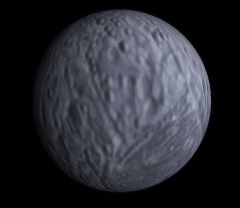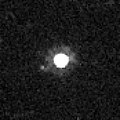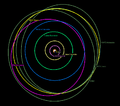50000 Quaoar
| Quaoar | |
|---|---|

| |
| Quaoar in Orbiter 2016 with D3D9 client | |
| Designation | |
| Name | 50000 Quaoar |
| Reference body | Sun |
| Planetary mean orbits | |
| Epoch | 2000 |
| Semimajor axis (a) | 6.48858219×1012 m |
| Eccentricity (e) | 0.037457 |
| Inclination (i) | 7.99199° (0.13948659 radian) |
| Longitude of the ascending node (LAN, ☊) | 188.9228383° (3.29732556 radian) |
| Longitude of periapsis (ϖ) | 156.2918857° (2.727808 radian) |
| Mean longitude (L) | 212.9680744° (3.7169941 radian) |
| Selected physical parameters | |
| Mean radius | 625000 km |
| Mass | 1.05×108 kg |
| Rotation elements | |
| SidRotPeriod | 375128 seconds (104.2 hours) |
| SidRotOffset | 0 |
| Obliqutiy | 0.13786666 |
| LAN | 1.456730694 |
| Note | *Elements given are from Quaoar.cfg (quaoar.zip) |
Quaoar also 50000 Quaoar is a dwarf planet located in the Kuiper Belt beyond the orbit of Neptunemaking it a Trans-Neptunian object. It is about one-half the size of Pluto and includes ring and a small moon (Weywot). Quaoar was discovered by Chad Trujillo and Michael Brown at the Palomar Observatory on 4 June 2002.
Quaoar in Orbiter
Quaoar was introduced to Orbiter on 3 December 2002 with the release of quaoar.zip at AVSIM.net by McDope. It appears to be modeled as a gray sphere. Gravity at the surface is essentially zero, so landed the ship will tend to drift up. The Delta-glider's landing light on the Delta-glider seems to be inoperative on the surface of Quaoar.
| Add-on | Source | Version | Author | Type | Release Date | Compatibility | Wiki article |
|---|---|---|---|---|---|---|---|
| Kuiper Objects Pack | O-F Resources | 2006-08-10 | markl316 | Scenery | 11 August 2006 | ||
| Quaoar | AVSIM | Manuel Amorim (McDope) | Scenery | 3 December 2002 | Orbiter 2002-P1 | ||
See also
Gallery
Hubble Space Telescope image of Quaoar and its moon Weywot taken in February 2006
from Wikimedia Commons
| edit The Solar System | |
|---|---|
| Central star |
Sun (Sol) |
| Planets |
Mercury - Venus - Earth - Mars - Jupiter - Saturn - Uranus - Neptune |
| Natural satellites |
Moon - Phobos - Deimos - Io - Europa - Ganymede - Titan - more... |
| Add-ons |
Planets - Dwarf Planets - Small objects - Natural satellites - Alternative star systems |




